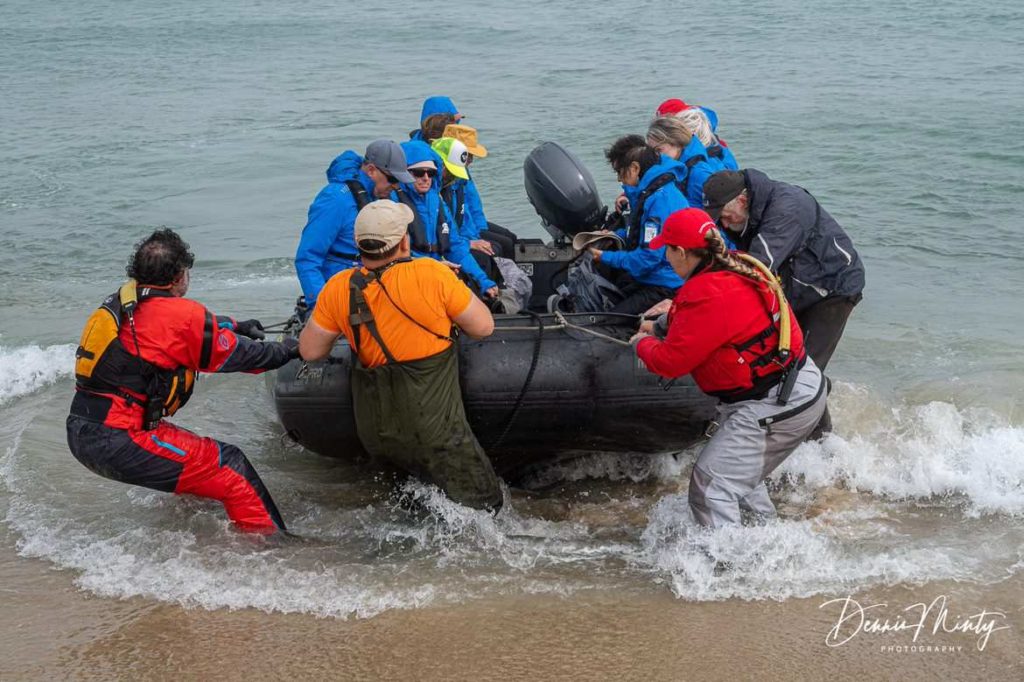Snapshots of Dementia: Not My Problem?

When my mom and I took our recent cruise, I left my caregiving responsibilities behind—but as I wrote last week, they didn’t leave me.
And guess what? Dementia didn’t leave me either—even when it wasn’t my problem.
On our first expedition day when we left the ship to visit Sable Island, Mom decided to stay behind. We left the ship according to color groups, so when the leaders called ours, I headed to the mud room—where we prepared to disembark—without her.
As I pulled on my waterproof pants, rubber boots, and other equipment, I noticed a woman I’d seen when Mom and I were having our boots sized. We’d introduced ourselves, and I remembered her name.
Today, she was visibly upset. “I don’t have a backpack,” she said. “My shoes will get all wet.” On the trip necessities list was a backpack (and dry bag to hold it) to carry hiking shoes, phones, and anything else we needed for off-ship excursions.
I’d already planned to carry Mom’s equipment in my bag. “I can take your shoes,” I told the woman. “I have extra room.”
She seemed overjoyed. “Oh, thank you! Thank you so much!” she told me as I stuffed her shoes into my pack. She disappeared after that, but I knew I’d find her on the island. I didn’t think she’d attempt a hike in her rubber boots.
For the next few minutes, I finished preparing, then followed the procedure we’d learned for safely seating ourselves on the zodiac. Despite some fog, we had a fairly smooth ride and landed on the island with the help of our “spinners,” who turned the zodiac and pulled it onto the beach.
Next, I headed for the area where we could change into our hiking boots. I didn’t have a hard time finding my new friend—not because she was looking for me, but because she was looking for her shoes.
“I can’t find my hiking shoes,” I heard her tell someone else. “I don’t know what happened to them!”
“I have your shoes!” I said, pulling them out of my pack.
Once again, she was overjoyed—momentarily. She didn’t say, “Oh, that’s right!” or “Of course!” She just accepted the shoes and moved on.
And I wondered.
From then on, I kept noticing this woman (I’ll call her L). Although L had an extensive vocabulary and could carry on an interesting conversation, every time I encountered her, she seemed a step behind. Once, she showed up with our color group on a tour segment—but she belonged in another. I saw others shaking their heads at her evident confusion.
And I wondered.
Another day, I was waiting in the ship’s lobby when L appeared—agitated and anxious about an off-ship excursion. Another woman explained what she would need, and L strode happily off to retrieve it. After she left, the other woman told me about multiple problems that had occurred because of L’s confusion. She seemed upset that another woman, L’s longtime friend, had in effect become her caregiver during the trip.
And I wondered.
I knew God must be putting something together when, the next day, I ended up alone with L’s longtime friend. In just a few questions, I determined that no, this was not typical behavior for L. Yes, others had suggested she see a neurologist. No, she did not want to do so—in fact, she insisted nothing was wrong.
A few odd happenings on a twelve-day cruise are not enough to diagnose dementia (or any other neurological problem), even if I were a medical professional. But these encounters—and my own experience with Tom—were enough to embolden me.
“I’m so thankful L has you to watch out for her,” I said to L’s traveling buddy. I shared a little bit about what I’d observed and about our journey. “I really hope you will do whatever you can to help her see a neurologist. At the very least, someone should find out what’s causing all this. If this isn’t normal for her, something must be going on.”
“I am so glad you spoke up,” L’s friend said. “This helps me so much.”
After that conversation, I saw very little of either L or her friend, although I did hear a bit more about her confusion. And I am still praying that once L returned home, someone was able to help her seek out some answers.
Of course, in our case, I took Tom to see a neurologist, only to be told for years that nothing was wrong. I can only pray that the doctors where this woman lives will be as attentive as the ones we have now—and that those who love her will push harder for answers than I did at first.
I don’t see dementia behind every bush. And I don’t know just what was happening with L. I do know that God gave me an opening to speak a word, and I took it. He doesn’t waste anything—even the most painful parts of our journey.
In the meantime, I’m keeping L in my prayers—and her caring friend too.
Do you know someone whose behavior and/or abilities have changed in significant ways? Does this person deny that a problem exists? All of these may be signs of dementia, and it would be wise to visit a neurologist for evaluation. Write down your concerns before you go, and don’t let the patient’s denial of symptoms dissuade you from speaking the truth. Feel free to share your comments below or on social media. Our story matters—and so does yours.




